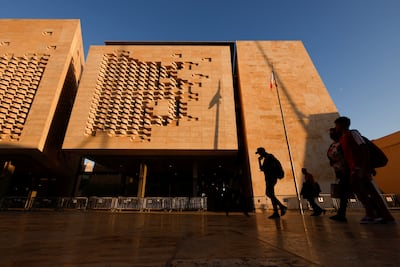An Instagram influencer who committed fraud and money laundering on a global scale has been sentenced to jail by a US court.
Ramon Abbas, known as Hushpuppi, will serve 11 years and three months in a California prison. He was ordered to pay more than $1.7 million in restitution to two fraud victims.
"Ramon Abbas targeted both American and international victims, becoming one of the most prolific money launderers in the world," said Don Alway, the assistant director-in-charge of the FBI's Los Angeles Field Office, in a statement on Monday.
Abbas, 40, was arrested in Dubai in June 2020 when police raided the five-star Versace hotel residence where he lived. He was later extradited to the US.
He had cultivated a following of 2.3 million on Instagram, where he showed off a penchant for Versace bathrobes and luxury cars. His account was shut down by the social media company last week ― after growing by 500,000 since his arrest.
Abbas admitted to attempting to steal more than $1.1m from a person who wanted to fund a new school in Qatar.
He further admitted to "several other cyber and business email compromise schemes that cumulatively caused more than $24 million in losses", the US justice department said.
Cyber bank heists and North Korean hackers
Beyond his guilty pleas accepted by the court, he was linked to more large-scale scams and frauds.
The FBI said he was linked to financial schemes involving North Korean hackers. Abbas was also implicated in a failed scam on an unidentified English Premier League club.
"Abbas leveraged his social media platforms... to gain notoriety and to brag about the immense wealth he acquired by conducting business email compromise scams, online bank heists and other cyber-enabled fraud that financially ruined scores of victims and provided assistance to the North Korean regime," Mr Alway said.
"This significant sentence is the result of years' worth of collaboration among law enforcement in multiple countries and should send a clear warning to international fraudsters that the FBI will seek justice for victims, regardless of whether criminals operate within or outside United States borders."
In January 2019, Abbas conspired with another man, Ghaleb Alaumary, 37, of Ontario, Canada, to launder funds stolen from a bank in Malta by providing account information for banks in Romania and Bulgaria.

The Justice Department said that the US has charged North Korean hackers with committing the bank cyber-heist in Malta, "and alleged that those funds were destined for the North Korean government. Abbas has admitted that the intended loss with respect to the Maltese bank was approximately $14.7 million".
The hack in 2019 caused chaos on the island of Malta, where payment systems shut down as Abbas attempted to move $13m through Bank of Valletta.
Despite his guilty plea and flash lifestyle, Abbas denied personally making millions as prosecutors had alleged.
At one stage in the trial, he passed a handwritten note to Judge Otis Wright in which he apologised and claimed he was using personal funds to repay his victims.
He claimed that he only ever made $300,000 from the crime he was tried for.
From 'Yahoo boy' beginnings to BEC scams
A BBC Africa investigation found that Abbas originally came from a poor area north of Lagos, with a mother who worked in a market and a taxi driver father.
It reported that he started out his fraudulent lifestyle as a 'Yahoo Boy', a Nigerian term for a hustler who spams web users with spurious requests for loans, cash transfers and even attempts at romance.
Abbas's later scams, using a technique known as business email compromise (BEC), were startlingly simple.
It begins with the fraudulent party identifying a company that has just ordered goods.
They send an email to that company posing as the supplier, from an email address that is almost exactly the same as the real supplier's, with just a single letter or number different.
Typically, the fraudster says the supplier has just changed their business bank account and lists the new account, claiming this is where the payment for the goods should be sent.
The FBI has put the value of such scams at $26 billion ― and growing every day. The average cost to a business is about $5 million per breach.
"The FBI investigated this matter as part of Operation Top Dog," the US statement added.
"The FBI thanks the government of the United Arab Emirates and Dubai Police for their substantial assistance in this matter."









